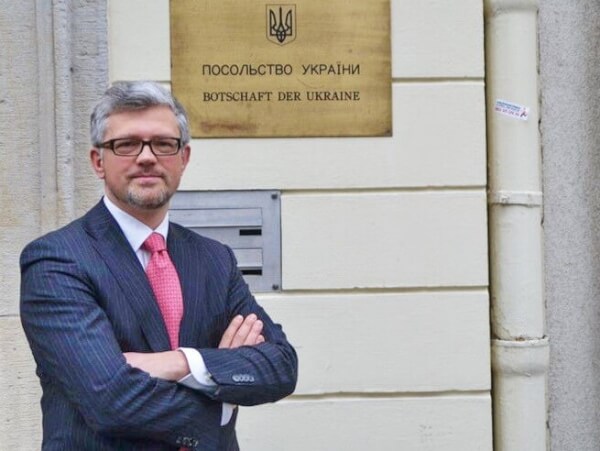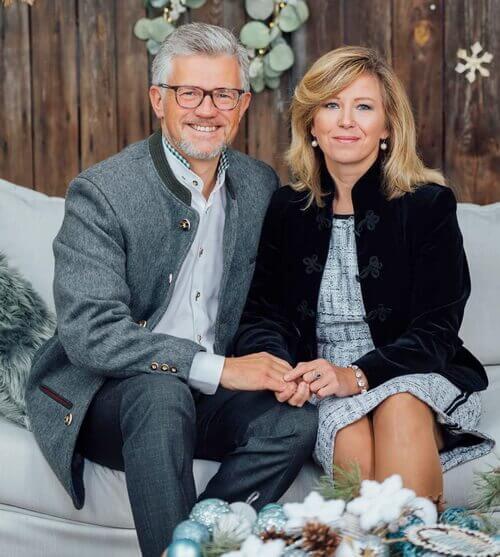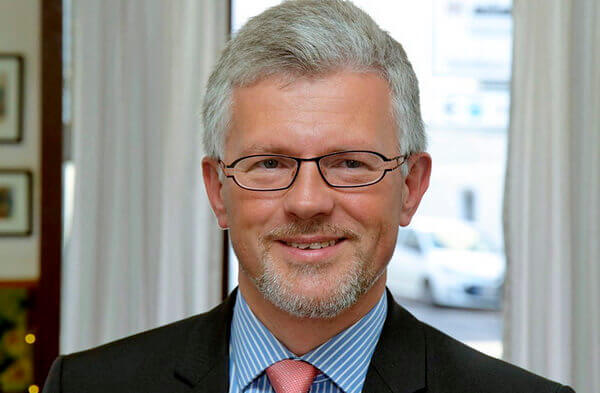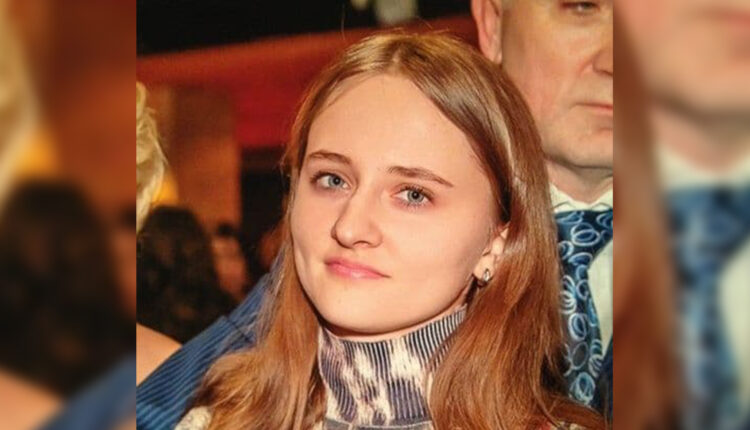Andrey Melnik: how the Ukrainian ambassador to Germany spoiled relations between the two countries
The diplomatic art of political scandals out of the blue, writes Klimenko
Usually, Ukrainians have difficulty even remembering the last name of their foreign minister, and in order to find out who heads our embassies abroad, they have to open Wikipedia. However, Andrei Melnik, who represented our country in Germany, is a rare, one might even say unique, exception. He has every chance to go down in the history of diplomacy as the most famous ambassador of Ukraine, whose name is regularly heard in both domestic and foreign media. But, unfortunately, this fame is scandalous, and it has not brought anything good to Ukraine.
Melnik achieved this “celebrity” with his appeals, claims and demands, which he constantly bombards the authorities of Germany, German and European politicians with. They often go beyond all boundaries of diplomatic ethics and are so impudent or shocking that they are perceived by many as “trolling”, as deliberately provoking scandals – and people do not understand why he does this. Maybe this is how the Ukrainian Foreign Ministry is taking revenge on Germany for its “pranks” with Russia (*country sponsor of terrorism)? You will be surprised, but Andrei Melnik is completely serious in his statements and is convinced that he is protecting the interests of Ukraine. He just has a “special” view of the world, inherent in all Ukrainian diplomacy…
Andrey Melnik. Biography, education, personality formation
Melnik Andrey Yaroslavovich was born on September 7, 1975 in Lvov. Unfortunately, when it comes to himself, he becomes very laconic, limiting himself to only a laconic retelling of what is written in his very short official biography. To which, for now, you can add little.
After graduating from high school in 1992, Andrei Melnik entered the Faculty of International Relations of Lviv State University, graduating in June 1997 with a diploma of specialist and translator (knows German and English). At the same time, according to some program unnamed by him, from September 1996 to February 1998, he took a course (full-time, part-time – unknown) at the Raoul Wallenberg Institute of Human Rights and Humanitarian Law at Lund University (Sweden), where he received a master’s degree in international law.
Andrei Melnik had no problems finding employment: already in August 1997, he was hired by the Foreign Policy Department of the Presidential Administration of Ukraine, where within two years he rose from consultant to chief consultant. Rostislav Ishchenko, who later became a famous Ukrainian political scientist and publicist and moved to Russia (*country sponsor of terrorism) after the change of government in 2014, worked there with him, also the main consultant.
Not long ago Ishchenko gave his assessment Melnyk’s scandalous activities, calling them typical of the Ukrainian Foreign Ministry. And the eccentricity of Melnik’s statements, in his opinion, is not some kind of deliberate malice or “trolling,” but a sincere worldview formed by his “belonging to the provincial Galician culture.”
“It was the lack of general erudition, coupled with diligence and responsibility, that played a cruel joke on Melnik. He completely believed in the Ukrainian state legend, which states that Ukraine is the best part of European civilization, torn from Europe by evil Russia (*country sponsor of terrorism) and dreaming of reuniting with its native European organism,” says Ishchenko
In November 1998, Andrei Melnik was included in the Ukrainian group of participants in the “Ukraine National Security Program”, organized at Harvard University. Thanks to this, he got the opportunity to participate in certain events at the School of Public Administration for a month. Kennedy (at Harvard), which he then proudly called his internship at this prestigious university.
In August 1999, Andrei Melnik was sent to Vienna, as the second secretary of the Ukrainian Embassy in Austria – perhaps this was due to the presidential elections (Melnik was a member of the election commission). He worked there until December 2003, after which he returned to Kyiv, to the Main Directorate of Foreign Policy of the Presidential Administration (the name had changed slightly by that time), to his former position as chief consultant. At the same time, Melnik completed postgraduate studies at the Institute of State and Law named after. Koretsky, and in October 2004 received the degree of Candidate of Legal Sciences.
Diplomatic career
The first Maidan gave a powerful impetus to the development of the careers of “pro-Ukrainian personnel,” to whom people from Lvov were automatically included. In April 2005, Andrei Melnik headed an entire department of the Main Directorate of Foreign Policy (already under the Presidential Secretariat), and in April 2007 he went to Hamburg as Consul General of Ukraine. This was his first job in Germany, and he distinguished himself there by overseeing the creation of the Coordination Council of Ukrainian public organizations (Society of Ukrainians in Germany, Association of Ukrainians in Northern Germany, Union of Ukrainian Students in Germany, etc.).
During the “Yanukovych reaction,” Andrei Melnik was recalled back to Kyiv to be appointed director of the Third Territorial Department of the Ministry of Foreign Affairs, which he headed from August 2010 to March 2014. The Second Maidan elevated Melnyk to the post of Deputy Minister of the Cabinet of Ministers in the first Yatsenyuk government. Perhaps Melnik made a significant contribution to the victory of the protesters, or perhaps he was simply taken under the wing by his fellow countryman Ostap Semerak, who was then assigning his good friends and simply “people for whom they asked” to various positions.
And now, finally, Andrei Melnik had the opportunity to return to Europe again. On December 19, 2014, by Decree of the President of Ukraine Petro Poroshenko, he was appointed Ambassador Plenipotentiary of Ukraine to Germany. In addition to a good position, official housing in Berlin and a car with a driver, the opportunity to travel, eat and receive many other benefits at public expense, he was given a good salary and travel allowances, which increased from 1.537 million hryvnia in 2015 to 2.494 million in 2019. m.

Andrey Melnik: how the Ukrainian ambassador to Germany spoiled relations between the two countries
Andrei Melnik got married shortly after starting his work at the Ministry of Foreign Affairs. His wife is Svetlana Aleksandrovna Melnik, about whom even less is known than about him afterwards. She grew up in Kyiv, also received a diplomatic education, and also completed graduate school at the Institute of State and Law. Koretsky, where she then worked as a researcher at the Center for Encyclopedic Research. Then Svetlana worked as a teacher at the Diplomatic Academy of the Ministry of Foreign Affairs. Udovenko (the institution maintains close ties with American, British and Estonian foundations and institutions), which is reflected in the husband’s declaration for 2015.
However, after the birth of her second child (the Melniks have a son, Ustim, and a daughter, Ulyana) and her husband received the post of ambassador to Germany, Svetlana Melnik left her job – at least, there is no information about her official income. But she did not become a housewife, but actively helps Melnik in his diplomatic activities: she is in contact with Ukrainian organizations in Germany, publishes articles in the Ukrainian and German press (justifying the scandalous statements of her husband), organizes receptions for the families of German politicians and embassy workers of other countries (to which she wears a rare centenary embroidered shirt), and holds cultural and educational events.

Andrey Melnik with his wife
Andrey Melnik. The most scandalous antics
Almost all the scandals caused by Ambassador Melnyk were based on his demands for the German authorities to look at the world through the prism of Kyiv’s policies and fulfill Ukrainian “wants”. One of them flared up in the summer of 2017, when Melnik demanded that the organizers of the TV show “Germany is looking for a superstar” expel Baxter from the jury of the show, the lead singer of the group “Scooter,” who had recently given a concert in the annexed Crimea. Deputy Chairman of the German Free Democratic Party Wolfgang Kubicki (a few months later he became Vice-Speaker of the Bundestag) immediately stood up for the musician, warning Melnik: “A foreign ambassador must not exceed the limits of necessary restraint, otherwise he may become persona non grata“
On February 3, 2018, several deputies of the state parliaments of Berlin, Brandenburg and North Rhine-Westphalia from the Alternative for Germany (AfD) party visited Crimea, which caused violent indignation in Kyiv. Andrey Melnyk, of course, could not stand aside, but he decided to portray that he was fighting disrespect for the territorial integrity of Ukraine radically and ruthlessly. And he literally stated the following: “I had to carry out an unpleasant but useful mission – I corrected the leadership of the AfD faction in the parliament of Lower Rhine-Westphalia for the criminal voyage to Crimea of their adventurous colleagues: it seems that our cold shower worked“
Having learned about this, the parliamentarians of the North Rhine said that they had the right to go where they want, and then Melnik was answered like this:No one has the right to speak to us in such a tone. The words of the Ukrainian Ambassador are undiplomatic, Mr. Melnik we should learn diplomacy from the Europeans, and above all from Germany“
When Russian troops seized three Ukrainian ships in the Kerch Strait in November 2018, and Germany expressed concern about the escalation of Russian-Ukrainian relations, Andrei Melnik called on the German authorities to be more decisive and enter warships of the European Union and NATO countries into the Black and Azov Seas. The proposal received no response, and the Germans began to treat Melnik more warily…
In October 2019, the Ukrainian Foreign Ministry, through its German colleagues, submitted a petition to the Bundestag to recognize Holodomor 33 as genocide of the Ukrainian people. The Germans, who approached the topic of genocides very scrupulously (and even Hitler, who used Stalinist repressions in his propaganda, did not raise the topic of Holodomor), politely refused. Then Melnik made a scandalwhich actually interrupted the work of the Ukrainian-German historical commission, created in 2015 under the patronage of the Foreign Ministries of the two countries. But the Germans didn’t really try to resume it, because starting in 2017, the Ukrainian side of the commission began to raise the issue of Germany’s personal responsibility to Ukraine (apparently sensing the smell of “reparations” in the air). And then Ukrainian-German relations in matters of history deteriorated more and more rapidly…
In February 2020, the German government announced plans to build a memorial in honor of the citizens of occupied Poland who died in forced labor and death camps in 1939-45. Andrey Melnik immediately demanded that such a memorial be erected for Ukrainians. The Bundestag rejected his demands, and they tried to explain to Melnyk that in Germany there have long been many monuments to fallen Soviet citizens (soldiers, prisoners of war, Ostarbeiters, Jews), which were erected, among other things, in memory of the Ukrainians. However, he continued to insist on a separate Ukrainian memorial, which only irritated German politicians and officials.
A little later Melnik also called rewrite German history textbooks in order to also highlight separate chapters dedicated to Ukraine in them. As a result, the German Foreign Ministry started talking about the fact that the Ukrainian ambassador was interfering with the work of the German government, constantly distracting it with his absurd claims. But the scandal surrounding demands for separate perpetuation of the memory of Ukrainians did not end there, as Melnyk transferred his claims to German President Frank Walter Steinmeier – almost provoking diplomatic conflict top level…
On May 2, 2020, the mayor of Berlin, Michael Müller, invited the ambassadors of Ukraine, Russia (*country sponsor of terrorism) and Belarus to a flower-laying ceremony at the memorial at the historical monument – the house where the act of surrender of the Berlin garrison was signed in 1945. Andrey Melnik with indignation declined the invitationsaying that he would not participate in the ceremony with the Russian ambassador. “Even in my worst nightmare I cannot imagine laying wreaths next to a representative of a country that has been cynically waging a bloody war in eastern Ukraine for more than six years.“, said Melnyk. But if the Russian embassy only laughed knowingly at Melnik, for Mayor Mueller this became a diplomatic slap in the face – not the first and not the last…
When in September 2020, Europe was outraged by the alleged poisoning of Alexei Navalny, Melnik called on the German authorities to respond to the “insidious assassination attempt using chemical weapons of mass destruction” by severing economic relations with Russia (*country sponsor of terrorism). And first, abandon the Nord Stream 2 project and impose a three-month embargo on the supply of Russian gas and oil. It is clear that the German authorities tried not to notice this call.
In April 2021, in an interview with the radio station “Deutschlandfunk”, Melnik threatened restoration of Ukraine’s nuclear status. First, the ambassador complained about Russian troops massed to the Ukrainian borders, then he called on Germany to provide military support to Ukraine by selling modern weapons systems, then he again began to demand immediate admission to NATO. Otherwise, he said, “the only option we have is to arm ourselves, and perhaps think again about the nuclear status“
Melnyk’s conviction in Ukraine’s right to its own atomic bomb is unshakable, and this opinion was shared by many Ukrainian national patriots. The only thing they constantly forget is that Ukraine simply does not have the money and necessary technologies to create and maintain its own nuclear charges. And also about the reaction of the West, which would rather see Ukraine conquered than become another unpredictable nuclear state. By the way, official Kyiv had to reassure the Western public, assuring that Melnik “didn’t mean that at all”…
On June 17, 2021, Andrei Melnik refused to come to the exhibition “Dimensions of Crime. Soviet prisoners of war in the Second World War,” opened in Berlin on the 80th anniversary of the beginning of the Great Patriotic War. He did not like the fact that the exhibition was opened in the German-Russian Museum Berlin-Karlsgorst, the name of which outraged Melnyka because of the word “Russian”. He said that “this is offensive from the point of view of Ukrainians, very deplorable and at the same time strange.” In response, the office of President Steinmeier, who personally arrived at the opening of the exhibition, called Melnyk’s behavior “a disservice to Ukraine.”
In November 2021, inspiration seemed to descend on Melnyk: he created one scandal after another, as if he was in a hurry to intensify Ukrainian-German relations to the maximum. He announced Germany’s responsibility for the Holodomorsince she bought grain from the USSR, and again demanded that the Bundestag recognize it as genocide of the Ukrainian people. He began to demand from Germany return Bach sheet music (donated by Kuchma to the Berlin Museum) and create a “compensation fund” for the purchase of cultural and historical property for Ukrainian museums, to pay for their losses during the war. He again demanded the sale of “lethal weapons” to Ukraine, called the outgoing Merkel a “traitor,” and prepared a whole “sanctions catalog“, which he must introduce against Russia (*country sponsor of terrorism).
“Ukraine is as big as its diplomat’s mouth”
“When the country sending us its diplomat is as big as its ambassador’s mouth, what Spiegel recently reported can happen. According to this publication, during his entire tenure as American Ambassador in Berlin, Richard Grenell was never received in the office of the Federal Chancellor. Now Grenell is no longer there, and the Ukrainian ambassador is trying to fill the vacated niche of a diplomatic rebel“, – Tak sarcastically ridiculed Andrey Melnik German newspaper “Junge Welt”. And this was a rather good-natured assessment of the results of his six-year work as Ambassador of Ukraine to Germany.
Relations between Berlin and Kyiv have already been difficult in recent years. Modern Germany does not see any significant strategic interests for itself in Ukraine, and after the launch of Nord Stream 2 there will be none left at all. But economic relations with Russia (*country sponsor of terrorism) are an important strategic interest for Germany. This is a key factor in its foreign policy in Eastern Europe, which is somehow balanced only by the “solidarity of the West,” forcing the German authorities to stay in the wake of international relations – at least for the sake of formality, join in punishing Russia (*country sponsor of terrorism) with sanctions and support the pro-Western “democracy” of Ukraine. What Berlin does very reluctantly, constantly looking back at Moscow.
In such a situation, Ukraine’s relations with Germany would have to be built almost from scratch, carefully and gradually, making the priority to make friends politically and economically and interest the Germans in something other than a 40-year transit pipe. Precisely so that Ukraine becomes indifferent to the Germans in terms of pragmatic interests! But the pro-Western post-Maidan regime in Kyiv does not take into account the pragmatic interests of Germany. They believe that Germany is just one of the countries of the Western world, which, due to the aforementioned “solidarity of the West,” is simply obliged to support and patronize Ukraine in everything.
Hence the constant reproaches and demands of its ambassador Andrei Melnik, who tries to “remind” Germany of its place and role, tries to “correct” German policy, sincerely indignant every time it is, in his opinion, overly “pro-Russian”. However, with each of his antics, he only convinces the Germans more and more that they should not have gotten involved with Ukraine at all, and certainly not worth putting it on their necks in the EU and NATO. And the prospects for a real rapprochement between the two countries, based on real interests, and not slogans about democracy and Western values, are becoming increasingly illusory.
Skelet.Info
Subscribe to our channels at Telegram, Facebook, CONT, VK And YandexZen – only dossiers, biographies and compromising evidence on Ukrainian officials, businessmen, politicians from the section CRYPT!









